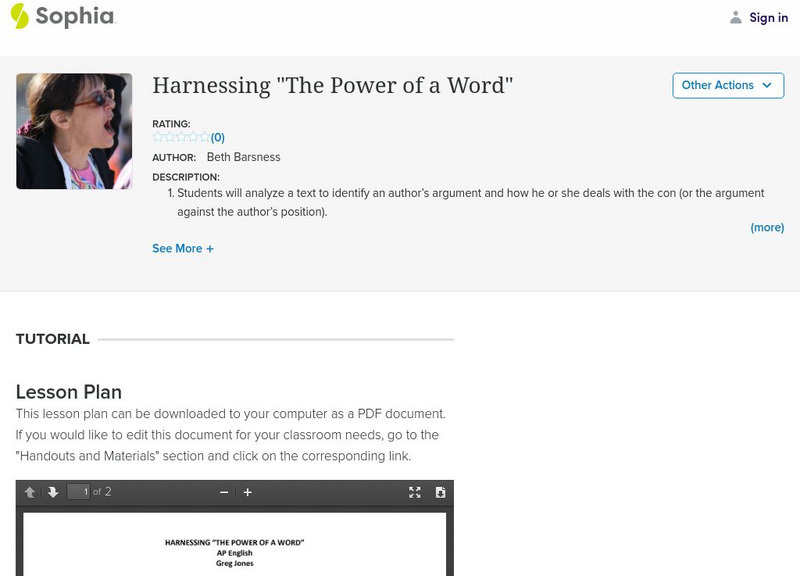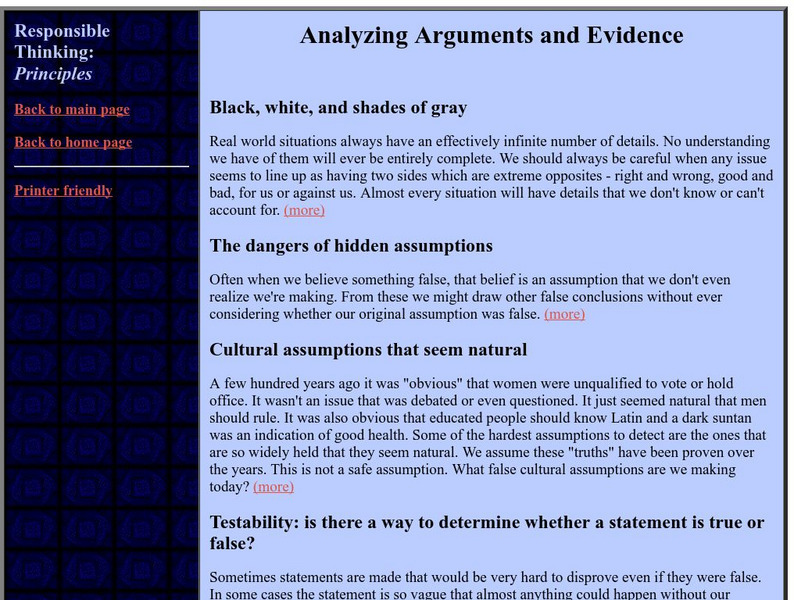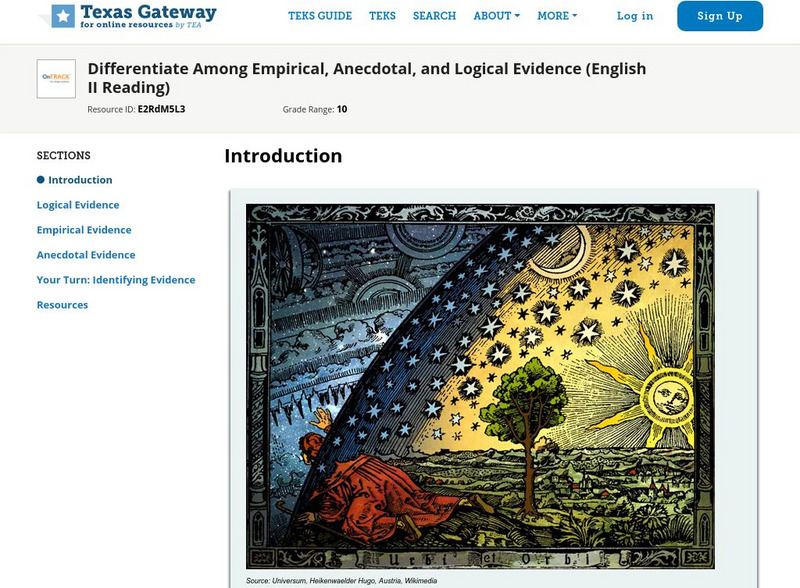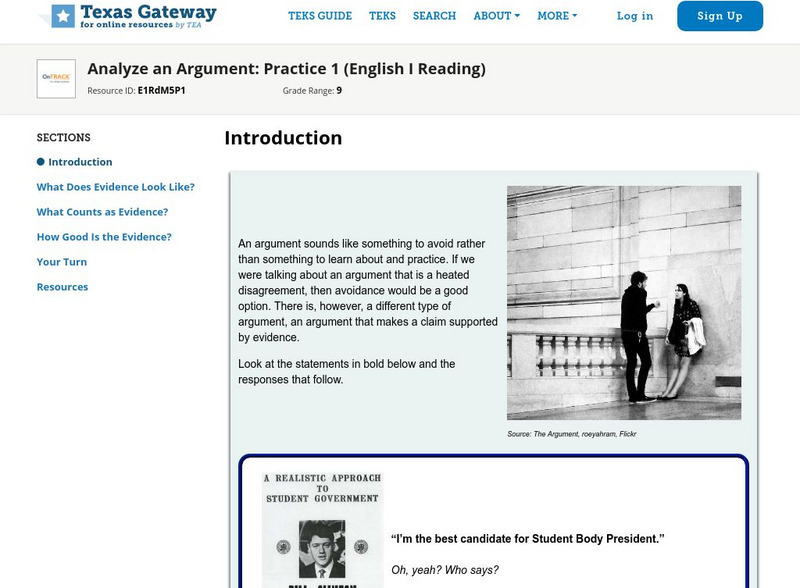Sophia Learning
Sophia: Harnessing "The Power of a Word"
In this PDF lesson plan, students will analyze the text "The Power of a Word" by Leonard Pitts, Jr. to identify an author's argument and how he deals with the counterargument. Students will extend the argument by agreeing or disagreeing...
Polk Brothers Foundation Center for Urban Education at DePaul University
De Paul University: Center for Urban Education: Evaluate the Strength of Evidence [Pdf]
This resource provides a downloadable worksheet that will assist students after they read a piece of nonfiction. Students will answer guided questions to help them determine the strength of evidence used when supporting a claim....
Other
Responsible Thinking: Analyzing Arguments and Evidence
Contains many points to consider when analyzing someone's arguments and evidence, such as the hidden assumptions, cultural assumptions, and testability. Each is explained in a short paragraph with a link to additional discussions on...
Texas Education Agency
Texas Gateway: Differentiate Among Empirical, Anecdotal, and Logical Evidence
[Accessible by TX Educators. Free Registration/Login Required] Distinguish among different kinds of evidence in a text that supports conclusions and arguments in texts.
Texas Education Agency
Texas Gateway: Analyze an Argument: Practice 1 (English Ii Reading)
Analyze the quality, relevance, and credibility of evidence that supports or opposes an argument.
TED Talks
Ted: Ted Ed: How Can You Change Someone's Mind? Hint: Facts Aren't Always Enough
Why do arguments change people's minds in some cases and backfire in others? Hugo Mercier explains how arguments are more convincing when they rest on a good knowledge of the audience, taking into account what the audience believes, who...
Texas Education Agency
Texas Gateway: Informational Text: Analyze an Argument: Practice 1
When you read an argumentative essay or article, you should analyze the author's evidence. However, you can't analyze the evidence a writer gives in support of a position if you don't know the author's perspective.
Other
Clark County Schools: Rna & Protein Synthesis: Claim, Evidence, Reasoning
This is one lesson in a larger learning module. In it, students investigate the essential question: How does DNA get the genetic message out so proteins can be built?
Other
Learning Design Collaborative: Cer: Claim, Evidence, and Reasoning
Students write a scientific claim that is backed up by evidence and supported by scientific reasoning. Base your answer on your reading of a data table.
Texas Education Agency
Texas Gateway: Analyze an Argument: Practice 1 (English I Reading)
In this lesson, you are going to practice analyzing the evidence that supports or opposes an argument. You are also going to learn to analyze the quality, relevance, and credibility of the evidence so you can decide whether to accept the...
Khan Academy
Khan Academy: Necessary Assumptions Learn More
Necessary assumption questions ask you to determine what has to be true - but was never explicitly stated - in order for an argument to work. Stated differently, if a necessary assumption were discovered to be false, the argument would...
Khan Academy
Khan Academy: Match a Flaw Learn More
Match a Flaw questions are nearly identical to Match the Structure questions, but with the added information that the argument in the passage is flawed (and therefore, the argument in the answer will be as well). They can sometimes be...
Khan Academy
Khan Academy: Match Principles Learn More
How do you match the principles of two arguments or situations? "Match principles" questions are similar to match structure questions in that the passage represents an argument or a situation, and each choice also represents an argument...
Khan Academy
Khan Academy: Match Structure Quick Guide
A quick guide to approaching LSAT test questions that ask you to match the structure of an argument in one of the answer choices to the structure of the argument in a passage.
Khan Academy
Khan Academy: Match Structure Learn More
"Match the structure" questions on the LSAT test your ability to determine how an argument goes. It begins with an argument in the stimulus and then asks you to choose another argument from among the choices that is structurally the...
Khan Academy
Khan Academy: Introduction to Arguments
The Logical Reasoning section of the LSAT assesses your ability to analyze arguments. This article introduces you to the components of an argument and how to recognize them. If this is new to you, it's a good idea to spend quite a bit of...
Khan Academy
Khan Academy: Identify the Technique Learn More
"Identify the technique" questions will ask you to describe the reasoning of an argument - the way it uses support to justify a conclusion. These questions focus on structure, method, and technique. They're not concerned with what the...
Khan Academy
Khan Academy: Types of Flaws
On the LSAT (as well as in real life), you'll encounter some types of flawed arguments more often than others. This article features some of the flaws that you're most likely to see on Test Day. The faster you can recognize these common...
Khan Academy
Khan Academy: Types of Evidence
It can be useful to separate and identify different types of evidence used in an argument to support a conclusion. There are many ways to support a conclusion; this article will walk through some of the most common ones that you may see...
Khan Academy
Khan Academy: Types of Conclusions
You might find it helpful to categorize the kind of conclusion you're dealing with as you approach passages that contain arguments on the LSAT. Your success in analyzing arguments-passages with a conclusion and supporting evidence-starts...
Khan Academy
Khan Academy: If X, Then Y Sufficiency and Necessity
In this lesson, you will learn how to recognize arguments that contain conditional statements, and learn the difference between sufficient and necessary conditions.
Khan Academy
Khan Academy: Necessary Assumptions Quick Guide
A quick guide to approaching questions that ask you to find an assumption required by the argument. This question asks you to identify the claim that must be true or is required in order for the argument to work. In other words, there is...
Khan Academy
Khan Academy: Identify the Role Learn More
Some questions ask you to describe the individual role that a statement is playing in a larger argument. These questions require you to understand the statement in question, but even more important is your understanding of its context...



![De Paul University: Center for Urban Education: Evaluate the Strength of Evidence [Pdf] Activity De Paul University: Center for Urban Education: Evaluate the Strength of Evidence [Pdf] Activity](https://d15y2dacu3jp90.cloudfront.net/images/attachment_defaults/resource/large/FPO-knovation.png)



















